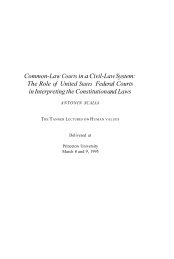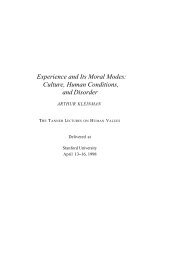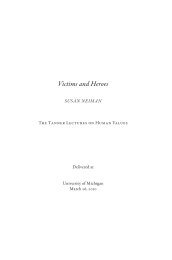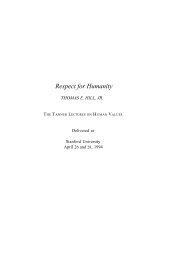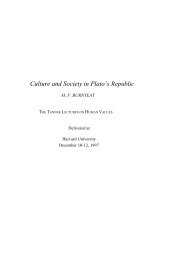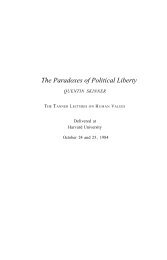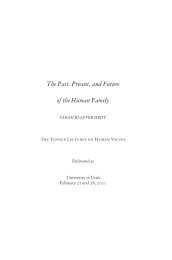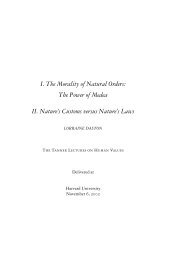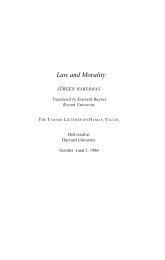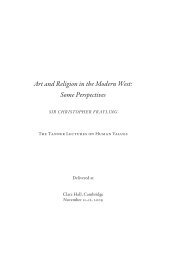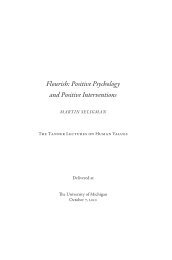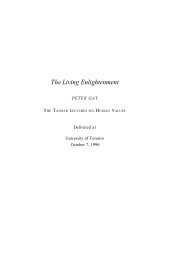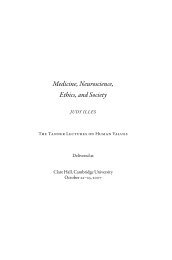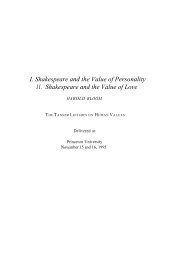Muguerza, Javier - The Tanner Lectures on Human Values
Muguerza, Javier - The Tanner Lectures on Human Values
Muguerza, Javier - The Tanner Lectures on Human Values
Create successful ePaper yourself
Turn your PDF publications into a flip-book with our unique Google optimized e-Paper software.
116 <str<strong>on</strong>g>The</str<strong>on</strong>g> <str<strong>on</strong>g>Tanner</str<strong>on</strong>g> <str<strong>on</strong>g>Lectures</str<strong>on</strong>g> <strong>on</strong> <strong>Human</strong> <strong>Values</strong>reas<strong>on</strong>, but - if we refuse to accept, as we are free to do, that the“rati<strong>on</strong>ality” of human “praxis” can be reduced to “instrumentalrati<strong>on</strong>ality”- we would at least be authorized to examine thepossibility of arguing in favor of the Kantian asserti<strong>on</strong> that man isan end in himself.In my opini<strong>on</strong>, the author who has most c<strong>on</strong>vincingly advancedthe possibility of this sort of argument is Tugendhat, whenhe c<strong>on</strong>siders it an “empirical fact” - the recogniti<strong>on</strong> of which isaided by the study of the process of socializati<strong>on</strong> - that regardingour lives and those of others we enjoy relati<strong>on</strong>s of mutual esteem(and its opposite), which make us feel that each of us is “<strong>on</strong>eam<strong>on</strong>g many” and subject in this way to a comm<strong>on</strong> morality(unless, that is, we suffer a Lack of moral sense, 85 a state thatTugendhat is inclined to c<strong>on</strong>sider “pathological”) 86 Up<strong>on</strong> sucha fact <strong>on</strong>e could go <strong>on</strong> to build a “morality of mutual respect,”a morality Tugendhat feels, in my opini<strong>on</strong> correctly, to be the“basic nucleus” of all other morality. This does not mean thatevery morality must needs be restricted to this nucleus, since evenKant’s own ethics - especially in c<strong>on</strong>necti<strong>on</strong> with his idea of the“supreme good” - could be derived from sources other than“respect.” 87But it certainly would be significant if the moralityof mutual respect - according to which the members of a moralcommunity would treat <strong>on</strong>e another as ends - were discoveredas a matter of fact at the base of every morality, which wouldrender it truly universal. 88 And, of course, Tugendhat’s positi<strong>on</strong>represents an advance over all those - this writer included -who have ever felt like c<strong>on</strong>ceding that the Kantian affirmati<strong>on</strong>that man is an end in himself is no more than a “humanitarianitalics.]85 [<str<strong>on</strong>g>The</str<strong>on</strong>g> words “lack of moral sense’’ were in English in the original; J.M.’s86 Tugendhat, Probleme der Ethik, 150ff., esp. 154-55, 156ff.87 See Jose G6mez Caffarena, “Respeto y Utopia: ¿Dos fuentes de la moralkantiana? “Pensamiento 34 (1978): 259–76.88 Tugendhat, Probleme der Ethik, 163–64.



